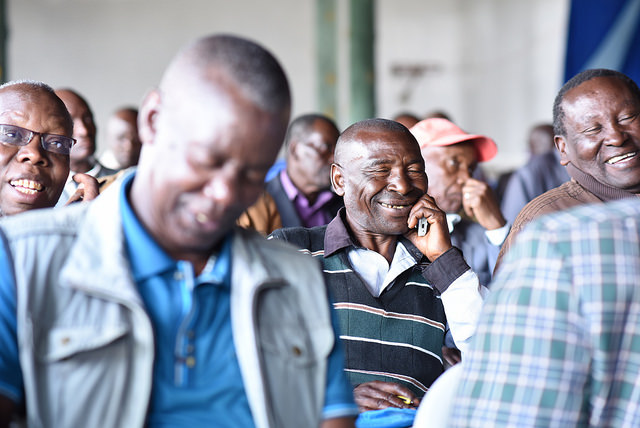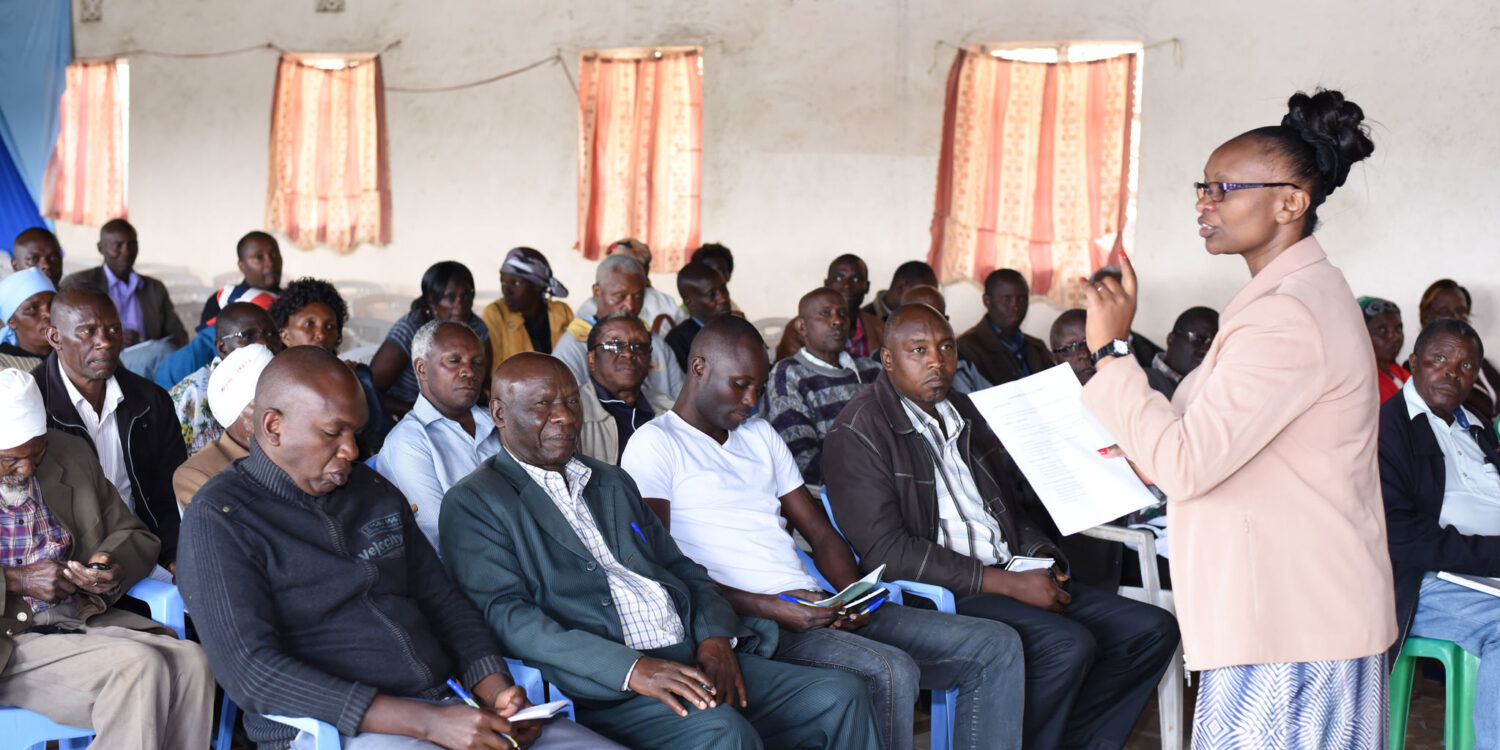Today, we started the community organisation process in line with the lessons that we have shared, that organised communities are an important ingredient for citizen participation and engagement. In Nakuru North sub-county, we are working with the local administration, led by the Deputy County Commissioner, Mr. Mutua Kisilu and his immediate Assistant County Commissioner 1 (ACC 1), Ms. Monica Ithatwa.
The process of organising the community is a three stage process that starts with the selection and induction of community leaders in each of the 12 locations in Nakuru North sub-county. The Open Institute is supporting the community organisation process which is led and driven by the local administration. As at now, each of the chiefs have held barazas (community meetings) in each of the locations and the community has nominated a number of community leaders to represent their households – each community leader representing about 30 households.
Starting today, the Deputy County Commissioner and the Assistant County Commissioner are going to be leading several officials who work directly with the community to induct the community leaders in each of the locations. The induction process involves explaining to the community leaders the functions of each of the government offices that they would work with and also show how they can work with each of those offices. The officers are keen to also hear from the community leaders how the community leaders hope to work together with them.
We started in Kiamaina location, a busy peri-urban community, inhabited by about 13,500 people in about 2,700 households, according to the Deputy County Commissioner’s estimates. Many of the inhabitants of the location rent homes in the location and work in the Nakuru Central Business District, about half an hour’s drive away. Many of the homes are built around existing farms – in which live the landlords. Kiamaina location is divided into two sub-locations ie Gituamba sub-location and Kiamaina sub-location.
The meeting to induct the location’s 90 community leaders kicked off with a warm welcome from the area chief and a word of prayer from one of the community leaders. As the leaders introduced themselves, we noted that the more metropolitan Kiamaina sub-location had greater representation in the meeting compared to Gituamba sub-location, which is more rural.
The ACC 1, Ms Monica Ithatwa started off the induction with the first session which was leadership and dispute resolution. She introduced the Nyumba Kumi concept to the leaders and explained that it is a citizen-driven initiative that would enable them to work together to solve local and immediate problems in their neighbourhoods. She also explained that the would be interacting closely with the government through local administration officials and with the police. She engaged the leaders in identifying the qualities of a good community leader which included: high integrity, a good listener, not greedy and committed to bring about positive change in their community. The discussion then proceeded to what their roles are as nyumba kumi leaders when it comes to development. They began by defining development as the growth the community makes towards advancing themselves e.g. if they have more university graduates from their community compared to the previous periods then that is development.
Among the discussions they had were the following key points:
- For development to happen in their community they would need to have a strategy and a development plan which they would formulate together with the community. Their responsibility as Nyumba Kumi leaders is to help the community in prioritising their needs as a community.
- It is important that the leaders identify the resources at their disposal and how they can access them. They should know the key players they can approach when it comes to matters development such as county government.
- It is also important for these leaders to anticipate risks that may arise as they push for development within their communities and know how to mitigate these risks. As nyumba kumi leaders the community looks up to them to ensure there is peaceful co-existence among them. In case of conflict these leaders should be able to handle conflicts through dialogue or arbitration, when these do not work they should escalate the matter to the respective authorities.
- As nyumba kumi leaders they play a big role in guiding the community to make sound political decisions.
The next session kicked off with a brief talk from the area’s agricultural officer madam Elizabeth Ochola who sensitized them to beware of the Army worm attacks on their crops as the planting season starts with the onset of the rains. She explained the agricultural extension services that are available to the community and how they should access them. She reiterated the government’s emphasis on food production and best farming practices.
The session was then followed by an engaging discussion with Mr. Biwott, the officer in charge of Education in the area. He explained to them that it was their role as nyumba kumi leaders to ensure that every school age going child was attending school and if not they should report to the necessary authorities. They aired some of the concerns they had, for example, that some parents were being charged admission fees and tuition fees by some of the secondary schools around the area and yet the government had announced free primary education for every secondary school going child.
Mr.Biwott noted these issues down and promised to carry out his own investigations and get to the bottom of it. It was noted also that high poverty levels in Kiamaina location were affecting education as some parents could not even afford school uniforms for their children. In such cases the community leaders resolved to organise the community to help the affected children where they could.
The next speaker was Ms. Elizabeth Karanja from the Adult Education Department. She provided the community leaders with information on adult education how and where they could access it. It was noted that there were many adults in the area – especially women, who had dropped out of school at primary or secondary level. Ms. Karanja bore a message of hope for them that they could complete their education and improve the quality of their lives. The community leaders were encouraged to promote adult education in their clusters.
“Let no woman or young person be lost because they did not go to school,” emphasised Ms. Karanja
The last session was facilitated by Mr. Peter from Child Protection Services who sensitized the community on matters relating to children rights. The community leaders were shocked to hear of the extent and prevalence of child abuse. Many of them were not quite aware that child labour constitutes abuse given that it is so rampant. Many children are forced to find odd jobs to help their families survive given the crippling levels of poverty they suffered. The community leaders learnt that it was their role to report to the authorities all cases of child defilement/child abuse – both physical and verbal, as well as cases of child labour.

We are excited that the leaders induction at Kiamaina location went well and the leaders were committed in leading their communities in the right direction.
We noted that the number of women representatives in the training was very low, there being around 15 women leaders in the audience out of 78 leaders who were in attendance. Out of these 15 women only one of them was active during the session. When this observation was made to audience, it was noted that most women the did not attend the chiefs meetings as they were held up doing the household chores and caring for the children. We also noticed dismal representation of young people as only one young person was nominated to be community leader. There is a perspective in the area that the youth are not yet qualified to be leaders.
We have held discussions with the DCC’s office to try and shore up at least the representation of women in the community leaders cohort from every community.
The meeting was closed by the DCC of Nakuru North Mr. Mutua Kisilu, who thanked all the leaders for their commitment and their efforts towards the nyumba kumi initiative. He urged them to keep on with the same spirit and encouraged them to be committed to work with the government at their local level to improve the lives of the community. He lauded them for volunteering their time and effort, noting that it was not a small thing.













